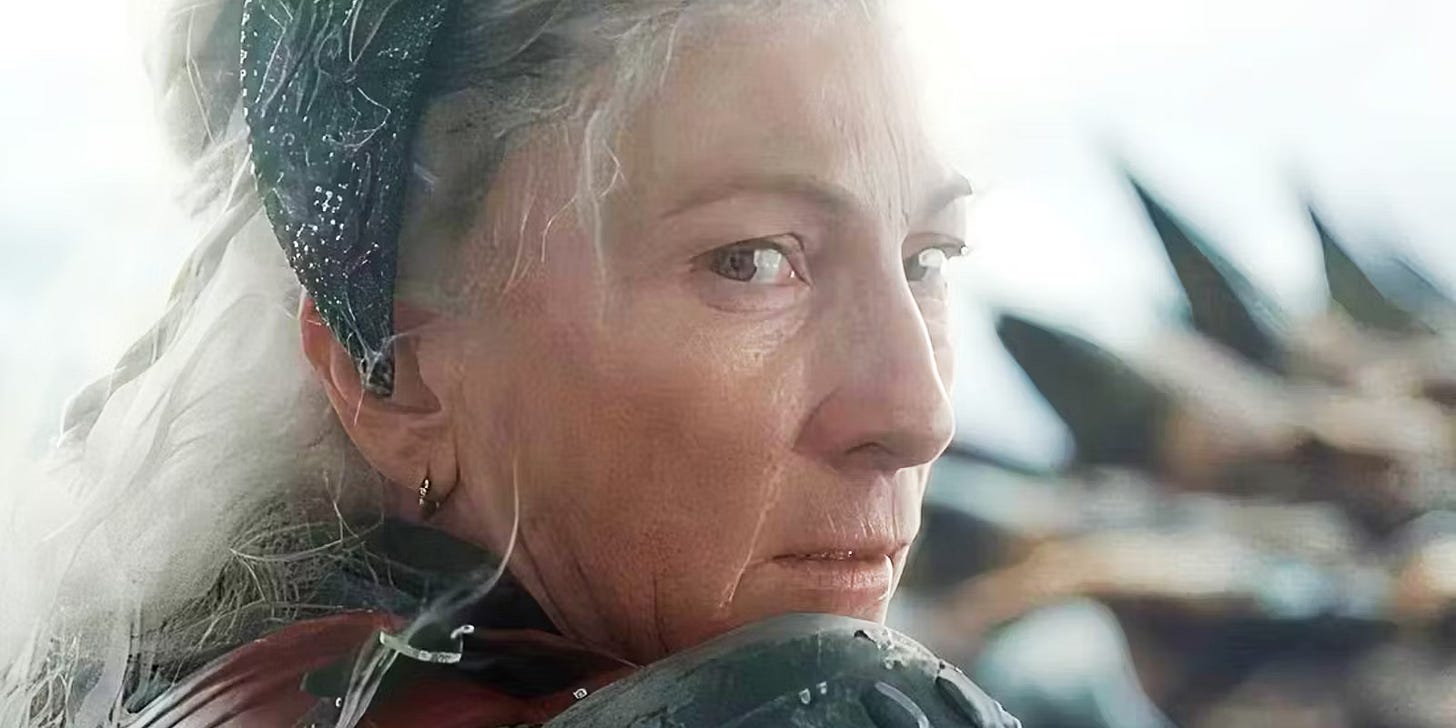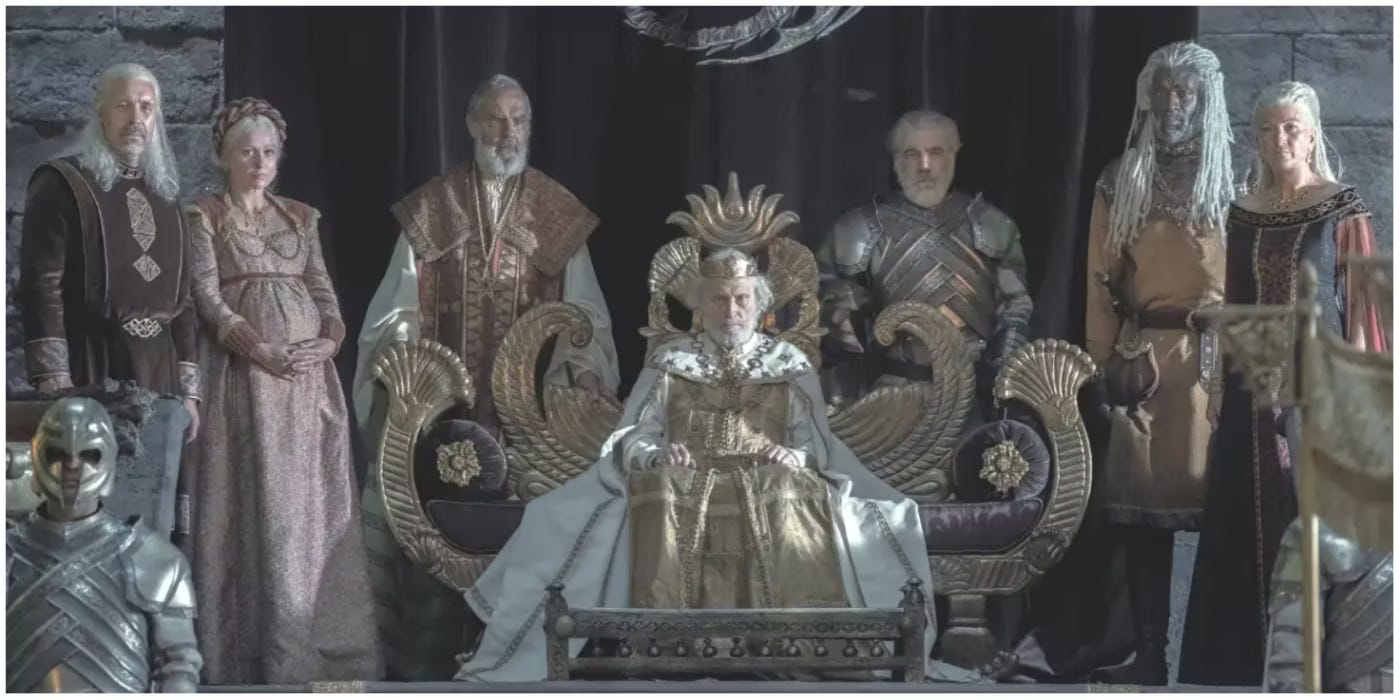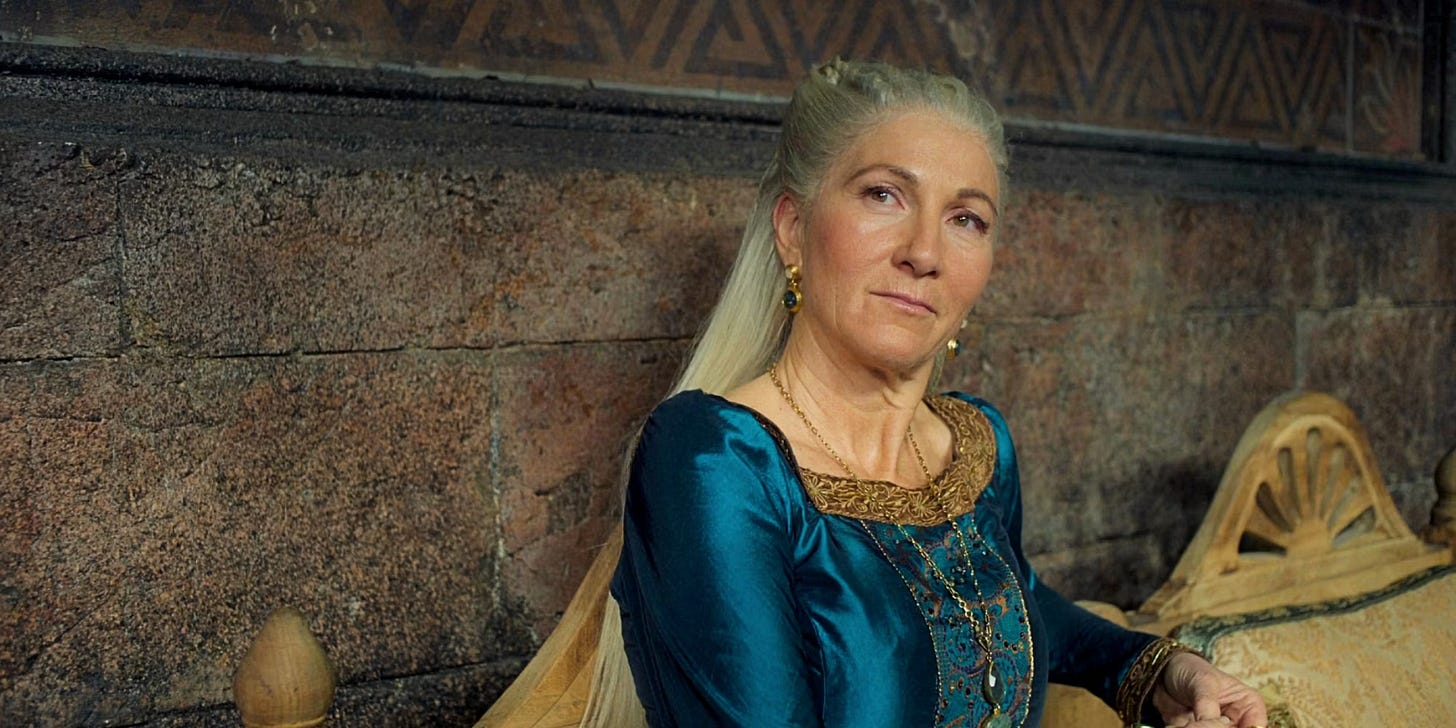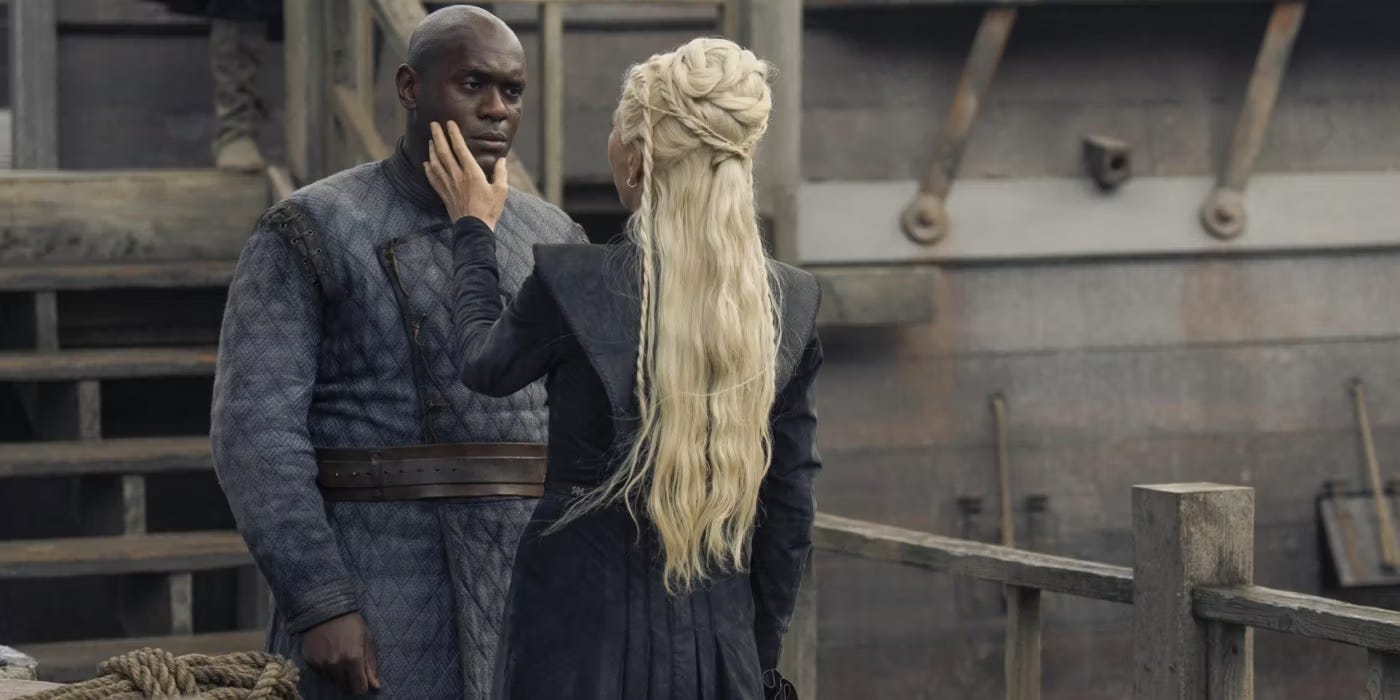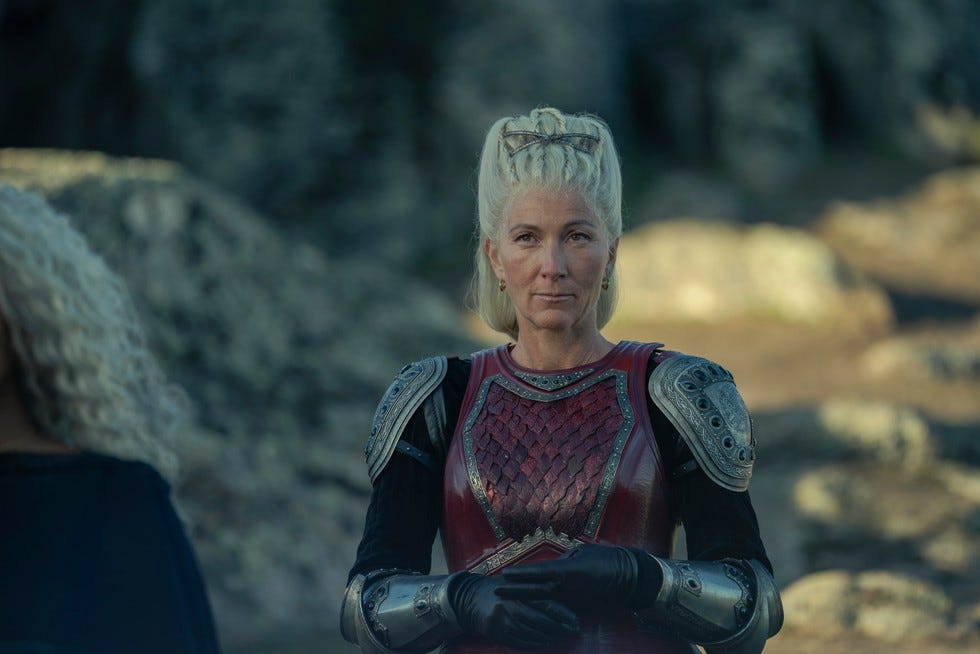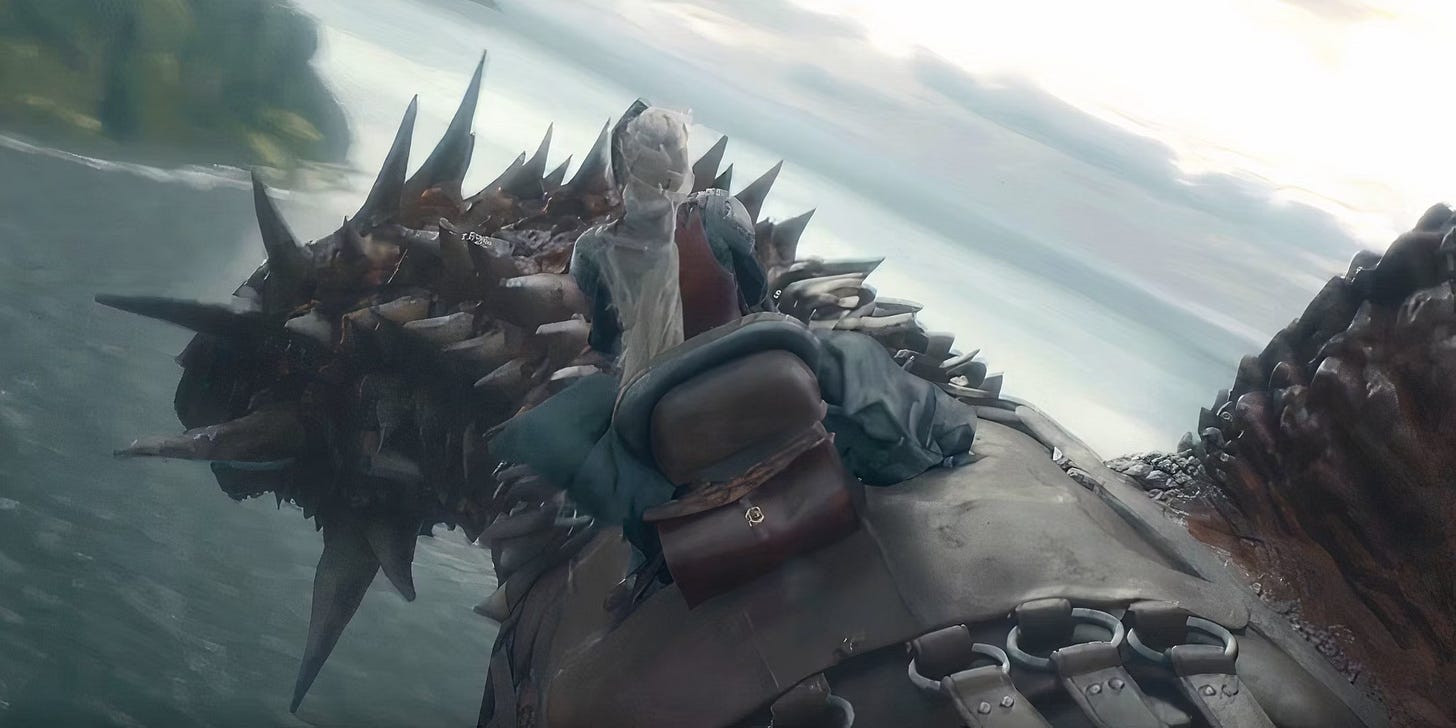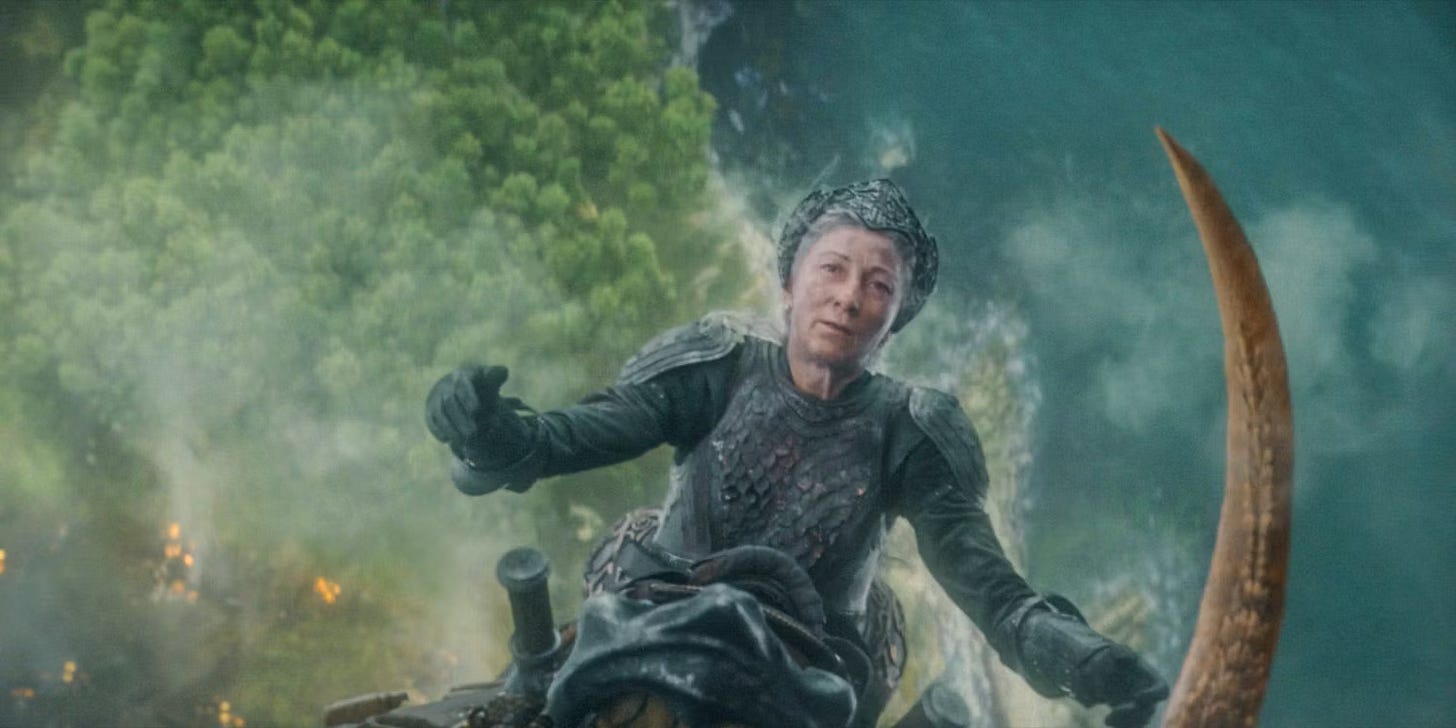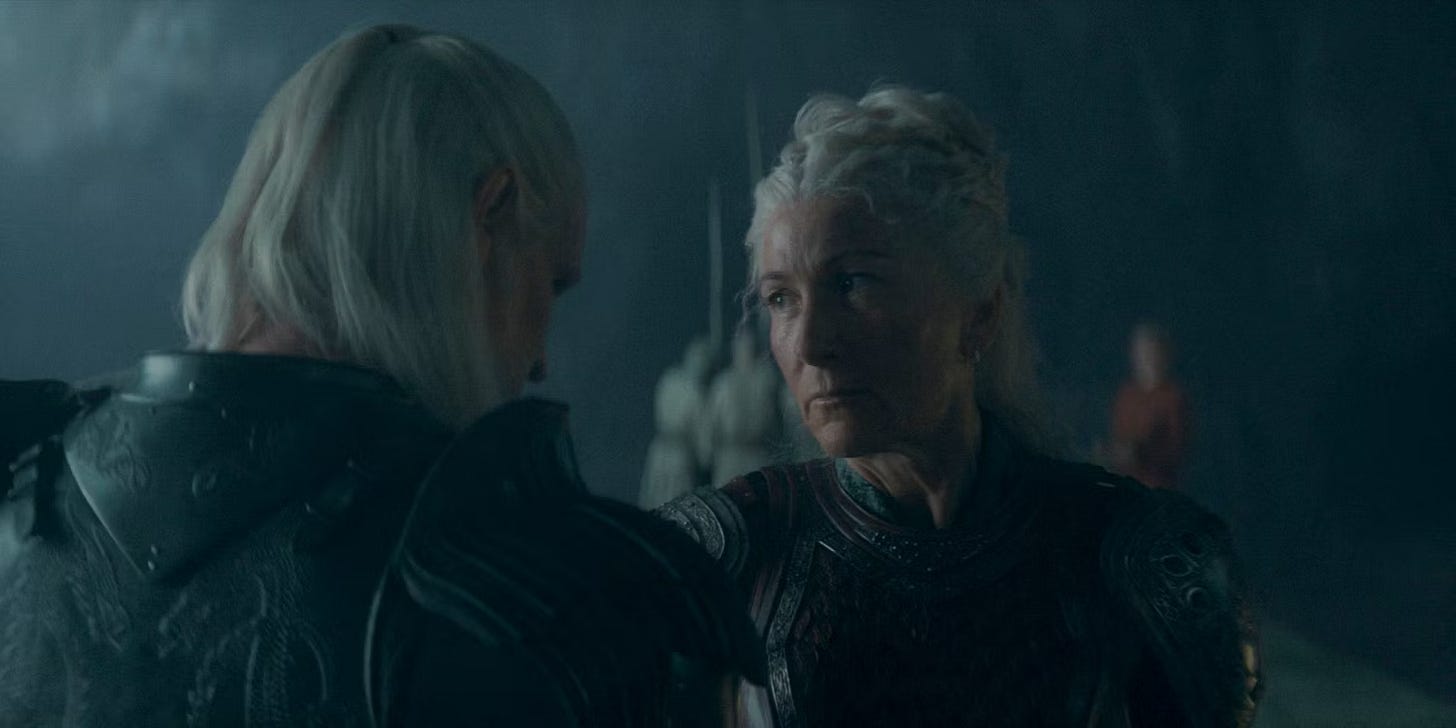The Short Take:
The action ramps up in a huge way. I should be careful what I wish for because we suffered a huge loss this episode.
New Dragon Count: 1
Cumulative Dragon Count: 7
[Spoiler WARNING: Just don’t. Not unless you’ve seen Season 2 Episode 4.]
Image Credit: Screen Rant
The Long Take:
A LOT happened in last week’s episode. We don’t even know if King Aegon is still alive. (And I know I’m posting this after the new episode has already dropped, but, on my honor, I have not seen it yet. I’ve never typed so furiously!) For me, however, the lasting impression this episode made was in the tragic death of Princess Rhaenys Targaryen, The Queen Who Never Was. She was my favorite character — smart, tough, caring, and, above all, sensible. She always emerged from prior episodes as the most reasonable voice in any room.
On the one hand, I feel as though her death was a waste — a cheap shot, taking such a beloved character away to demonstrate that dragon warfare is as devastating as everyone keeps saying it is. On the other hand, this death was as epic and glorious as it was heartbreaking, which seems fitting for a Targaryen so regal.
Thus, in tribute, I give you this listicle. Here’s why Rhaenys was the best Targaryen to ever do it.
5. She handled not getting The Throne exceptionally well.
Image Credit: CBR
The Targaryen family is full of a bunch of lovable brats (ahem, Aegon, ahem), ever sullen about not getting The Throne (ahem, Daemon, ahem), about the Throne being taken away from them (ahem, Rhaenyra — though she’s not as bad), or simply coveting everyone’s favorite thorny chair (ahem, Aemond!). Rhaenys, however, is too classy for all of that. While she is not happy about this turn of events by any means, she accepts her fate and doesn’t let it interfere with her behavior more than any other Targaryen we see on the show.
I recall not seeing this at first because back in Season 1, our introduction to Rhaeynys was her prickly conversation with young Rhaenyra. She seemed so bitter about never becoming Queen. And she very frankly levels the following claim: “Men would sooner put the realm to the torch than see a woman ascend the Iron Throne.” I remember the conversation coming across as petty and possibly even hostile, as if Rhaenys were jealous of Rhaenyra potentially getting what she was denied so long ago. For those who do not recall, The Great Council at Harrenhal — a.k.a. the patriarchy — passed over Rhaenys for Viserys because they believed in following male heirs only.
Image Credit: Screen Rant
I read all that differently now that Rhaenys has given her life in Rhaenyra’s name. Sure, that early conversation still reflects Rhaenys’ skepticism of Rhaenyra as an heir capable of handling the misogynist headaches to come, but, in retrospect, her words back then seem much more like warning to Rhaenyra now, telling her not get her hopes up.
Once Rhaenys joins Team Black, it’s clear that she’s actively fighting the patriarchy in whatever way she still can by supporting Rhaenyra. That she doesn’t do the classic anti-feminist move of putting other women down to try to get some feeble sense of power back. She’s flying down to help Baela face Rhaenyra’s Small Council in her absence. She refuses to acknowledge Daemon as in charge. She empowered Rhaenyra and encouraged her to stand up to the men trying to shove her out of the conversation. How many other characters on this show would have done that?
4. She does not blame Corlys’ illegitimate children for their father’s infidelity.
Image Credit: CBR
While I too was confused for the 3 seconds Rhaenys caresses the side of Alyn’s face, I pretty quickly figured out that she was acting that way because she knew Alyn was Corlys’ bastard son. I’m not the first to make this comparison by any means, but this struck me as so obviously the polar opposite to Catelyn Stark, who infamously shunned Jon Snow because he painfully reminded her of what she (mistakenly) assumed was Ned Stark’s affair with another woman. Rhaenys once again — and very directly — drops some knowledge when she says to Corlys, “I know who he is, Corlys. Alyn's past is no fault of his. He saved his lord's life. He should be raised up and honored, not hidden beneath the tides.” There’s not a petty bone in her body here. She may still disapprove of Corlys’ behavior, but she is self-possessed enough, secure enough to champion Alyn. I have a sneaking suspicion that her words will hit Corlys even harder now that she’s died. And this will, as has been heavily foreshadowed, lead to Alyn and his brother Addam taking on a bigger role in the story (and the war). Seasmoke is right there…
3. She used her critical thinking skills before choosing a side.
Image Credit: Radio Times
In many ways, as I’ve discussed in my previous reviews, the Dance of the Dragons has been set on course, with the lines drawn, for a very long time. The schism between Alicent and Rhaenyra, the incident with Aemond’s eye, etc… The notable exception to this, of course, is Rhaenys. She abstains from the conflict for some time, to the point at which Alicent holds her captive in King’s Landing because she’s not sure which side Rhaenys would take in the line of succession dispute. Don’t forget that she talks to Alicent, escapes, then talks to Rhaenyra, and only after staying in Dragonstone for some time does she decide which horse she’s betting on. She sees right through Alicent’s vaguely threatening spin doctoring and while she side-eyes Daemon, she recognizes that Rhaenyra isn’t reacting purely from emotion and is, as she says, the only one in the room hesitant to plunge the realm into war. Alicent concludes that it’s only the rhetoric rather than the truth that matters after she learns about her mistaking Aegon the Conquerer for Aegon her nitwit son. Rhaenys operates from the premise that the truth itself matters as much as the conviction behind it.
2. She loves her dragon.
Image Credit: Screen Rant
Part of what made Rhaenys’ death so disheartening was how she acted towards her dragon, Meleys, before, during, and after the battle against Aemond/Vhagar and Aegon/Sunfyre. The pained look on her face right before she tells Melys to attack once more, knowing that she may be giving a suicidal command. The way Melys looks back at her moments before dying, as if to say, “I’m sorry I wasn’t good enough.” The way Rhaenys straps herself into the saddle, as if to declare that if she’s putting her dragon in harm’s way, she’s prepared to go down with her (no parachutes here — only free falls). All of it broke me. I kept gasping and saying “noooooo” throughout that entire scene. It mattered so little that I knew it was coming. (And I did. The second Rhaenys volunteered, I knew she was toast. The first real dragon battle in this war had to come at a high, high cost. And we’d already killed enough children for the time being. There was just no way around it.) I love dragons. Rhaenys loves her dragon. Ergo, I love Rhaenys.
1. She was willing to sacrifice herself to end the war.
Image Credit: Screen Rant
Many fans reacted to Rhaenys’ death as an unnecessary mistake because after the first run-in with Sunfyre and Vhagar, she should have high-tailed it out of there knowing she was out-dragoned. She could have easily gone back to Dragonstone for backup. And I concede that this makes logical sense. Her refusal to flee the scene seems like poor strategy. She’s not min-maxing her dragon power. All the other items on my list point to Rhaenys being even-keeled and logical. So why would she make this seemingly illogical decision to hang around long enough to serve Melys up as a snack for Vhagar (who clearly is the one at Thanksgiving dinner who wants that turkey neck)?
There’s a lot that could be going into her thought process in this pivotal moment, and, thanks to the work that the series has put into developing her character up until this point, they all came flooding in. Earlier in the season, she spectacularly told off Daemon when he accused her of letting the war get to this point because she, when she had the chance, did not roast Aegon after bursting out of the Dragonpit at the end of Season 1. She says that it was not her war to begin. And she still believes that in her final moments, I think. (See my earlier entry about her waiting to weigh in on the war until she could hear both sides!)
But that doesn’t mean that she doesn’t feel as though she wants a moment like that to pass her by again. Perhaps she wants to make up for her inaction by going above and beyond in taking action now. Because if she can take out Aemond, there would not be as obvious an heir to take Aegon’s place (again, I’m assuming he’s dead, but who knows!) and if she can take out Vhagar, then the balance dragon power (cue Oscar Isaac saying dragon power like desert power) drastically shifts in Rhaenyra’s favor. I think you can definitely argue that she sees this as her one shot that she has to take, even if the chances of success are slim. She could also be thinking about what Aemond did to Lucerys, who is at least in name the son of her own son, Laenor. She could be thinking about what Aemond did in claiming Vhagar AT HER DAUGHTER’S FUNERAL. She may still think of Vhagar as Laena’s dragon, stolen by Aemond at the least tasteful moment.
But also, she could just be a hardcore queen in the best way. What would be much more in keeping with her character would be to simply say that she thought she could do the most good and cared more about that than herself.
Even if it defies logic and good strategy, it’s hard to argue with the dramatic value of Rhaenys’ death and how we got there. The series knew exactly what it was doing when it sent her into the first fray. I now regret ever having said we need more dragon on dragon action.
The Queen Who Never Was is no more. And I will miss her dearly.




